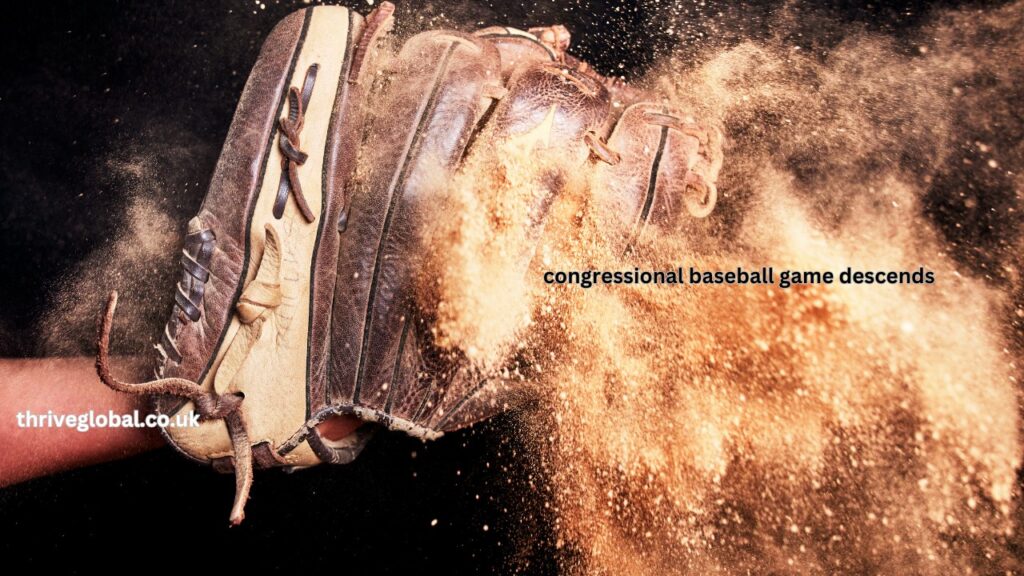The The Congressional Baseball Game Descends, a tradition dating back to 1909, brings together members of Congress from both sides of the aisle for a friendly game of baseball. The annual event, typically held at Nationals Park in Washington, D.C., is designed to foster bipartisanship and camaraderie among political rivals. Despite its humble beginnings as a lighthearted contest, the game has at times descended into fierce competition, reflecting the growing political polarization in the country.
This article delves into the origins of the Congressional Baseball Game, its evolution over the years, and how the game has occasionally been marred by political tensions and external events.
A Brief History of the The Congressional Baseball Game Descends
The first The Congressional Baseball Game Descends took place in 1909, thanks to Representative John Tener, a former professional baseball player and future Governor of Pennsylvania. Tener’s vision was simple: to use America’s favorite pastime as a means of promoting goodwill among members of Congress. Initially, the game was a modest affair, held on a local field with little fanfare.
Over the years, the game grew in prominence, becoming a highly anticipated annual event. Members of Congress, divided into teams by party affiliation—Democrats and Republicans—faced off in a nine-inning showdown. The game soon became a fixture of Washington’s political and social calendar, with funds raised going to local charities. While the primary goal was to raise money for good causes, the game also served as a rare opportunity for lawmakers to set aside their political differences and connect on a personal level.
Evolution of the Congressional Baseball Game
The Early Years
In its early days, the Congressional Baseball Game was a small, low-profile event. Games were often held on military fields or public parks, and the level of play varied widely depending on the athletic prowess of the members involved. However, the game’s popularity grew steadily, and by the 1960s, it had become a more formalized and competitive affair.
One of the most famous games from this era took place in 1962 when President John F. Kennedy threw the ceremonial first pitch. His presence signaled the game’s importance as a unifying force in Washington politics.
Moving to Major League Stadiums
In the 1970s, the game moved to a more prominent stage: RFK Stadium, home of the Washington Senators at the time. The transition to a major league venue reflected the game’s increasing popularity and growing significance. By this point, the Congressional Baseball Game had become a marquee event, attended by thousands of spectators, including members of the press, lobbyists, and constituents.
Over the next few decades, the game moved to Nationals Park, the home of the Washington Nationals. The transition to Nationals Park in 2008 marked a new era for the game, further cementing its status as a major political and charitable event. The game raised millions of dollars for various charities, including the Washington Literacy Center, the Boys and Girls Clubs of Greater Washington, and the Washington Nationals Dream Foundation.
The Game’s Descent: Political Rivalries on the Field
While the Congressional Baseball Game has always been competitive, recent years have seen a noticeable shift in tone. What was once a lighthearted contest has, at times, descended into a microcosm of the deep political divisions that characterize modern American politics.
Growing Political Tensions
The increased polarization in Washington has inevitably spilled over onto the baseball field. In recent years, the game has become more than just a friendly competition—it’s become an extension of the partisan battles fought daily on Capitol Hill. Some lawmakers have viewed the game as an opportunity to assert dominance over their political rivals, leading to more intense play and, occasionally, unsportsmanlike behavior.
In some instances, the game’s traditionally jovial atmosphere has been replaced by palpable tension. Trash talk, which was once good-natured, has at times taken on a more bitter tone, reflecting the deep ideological divides between the two parties.
High Stakes and Intense Rivalries
As the stakes of the game have grown—both in terms of charitable contributions and bragging rights—the intensity of the competition has ramped up. In some cases, players have trained for months in preparation for the game, hiring personal coaches and holding frequent practice sessions. For many members of Congress, especially those with athletic backgrounds, winning the Congressional Baseball Game has become a point of pride.
The heightened intensity of the game reached its peak in 2017 when a tragic shooting at a practice session for the Republican team resulted in several injuries, including life-threatening injuries to House Majority Whip Steve Scalise. The incident shook Washington to its core, highlighting the real-world consequences of the country’s political divisions. In the aftermath, there were renewed calls for unity and bipartisanship, though the game has since continued to reflect the broader tensions in American politics.
Notable Moments in Congressional Baseball History
Despite the occasional political tension, the Congressional Baseball Game has produced many memorable moments that demonstrate the spirit of sportsmanship and camaraderie.
The 2017 Shooting and Its Aftermath
The most somber moment in the game’s history came in 2017, when a gunman opened fire at the Republicans’ practice session in Alexandria, Virginia. The attack left several people injured, including Rep. Steve Scalise, who was critically wounded. The shooting cast a shadow over that year’s game, but it also served as a rallying point for members of both parties to come together in support of their wounded colleagues.
In the days following the shooting, there was a renewed emphasis on the game’s original purpose: fostering bipartisanship. When the game was played just a day after the attack, Scalise’s absence was felt deeply by both teams. The game served as a powerful reminder that, despite their differences, members of Congress are still capable of coming together in the face of tragedy.
Barack Obama’s First Pitch
In 2010, President Barack Obama attended the Congressional Baseball Game and threw the ceremonial first pitch, marking the first time in decades that a sitting president had participated in the event. Obama’s appearance symbolized the game’s importance as a unifying force in American politics, despite the increasingly partisan nature of Washington.
Celebrity Appearances and First Pitches
Over the years, the Congressional Baseball Game has attracted its fair share of high-profile attendees. From presidents to celebrities, the game has become a gathering point for prominent figures in Washington and beyond. Celebrities and former MLB players often throw out the first pitch, adding to the game’s festive atmosphere.
The Role of Charity in the The Congressional Baseball Game Descends
One of the most important aspects of the Congressional Baseball Game is its charitable component. While the game itself is an opportunity for lawmakers to blow off steam and engage in friendly competition, the primary goal is to raise money for worthy causes. Over the years, the game has raised millions of dollars for a variety of charities, many of which benefit children and families in the Washington, D.C. area.
The Washington Literacy Center
The Washington Literacy Center, one of the primary beneficiaries of the game’s proceeds, works to combat illiteracy among adults in the nation’s capital. By providing literacy programs and resources, the center empowers individuals to improve their reading and writing skills, ultimately helping them gain greater access to educational and employment opportunities.
The Boys and Girls Clubs of Greater Washington
Another major beneficiary is the Boys and Girls Clubs of Greater Washington, which provides after-school programs and activities for children and teens in the D.C. area. These programs focus on academic success, healthy living, and character development, helping young people reach their full potential.
The Washington Nationals Dream Foundation
The Washington Nationals Dream Foundation is the charitable arm of the Washington Nationals baseball team. The foundation focuses on improving the lives of children and families in the Washington, D.C. area through programs that promote education, health, and recreation. The foundation’s support of the Congressional Baseball Game helps to strengthen its impact on the local community.
How the Game Reflects Broader Political Trends
The Congressional Baseball Game is more than just a sporting event; it is a reflection of the broader political landscape in the United States. The game serves as a microcosm of the challenges facing American democracy, highlighting both the deep divisions that exist between the two major parties and the potential for unity in the face of adversity.
Polarization in Politics
As the game has grown more competitive, it has also become a symbol of the increasing polarization in Washington. What was once a lighthearted event has, at times, become a battleground for political rivalries. This shift mirrors the broader trend of partisanship in Congress, where compromise has become increasingly rare and political discourse has grown more combative.
The Potential for Unity
Despite the tensions, the Congressional Baseball Game still has the potential to bring members of Congress together. In moments of crisis, such as the 2017 shooting, the game has served as a powerful reminder of the importance of unity and bipartisanship. Even in the most polarized political environment, the game provides a rare opportunity for lawmakers to set aside their differences and come together for a common cause.
The Future of the The Congressional Baseball Game Descends
Looking ahead, the future of the Congressional Baseball Game remains uncertain. As political polarization continues to intensify, there are questions about whether the game can continue to serve as a unifying force in Washington. However, the game’s enduring popularity and its charitable mission suggest that it will remain a fixture of the political calendar for years to come.
Calls for Greater Sportsmanship
In recent years, there have been calls for lawmakers to tone down the intensity of the game and return to its roots as a friendly, bipartisan contest. Some have suggested that more emphasis should be placed on the charitable aspect of the game, rather than the competition itself.
A Return to Bipartisanship
Many in Washington hope that the game can once again become a symbol of bipartisanship, rather than a reflection of the deep divisions in Congress. While it remains to be seen whether this will happen, the game’s history suggests that it has the potential to bring members of Congress together in the spirit of cooperation and goodwill.
FAQs
What is the purpose of the Congressional Baseball Game?
The primary purpose of the Congressional Baseball Game is to promote bipartisanship and raise money for charity.
How long has the Congressional Baseball Game been played?
The game has been played since 1909, making it one of the oldest traditions in Washington politics.
Who participates in the Congressional Baseball Game?
Members of Congress from both the Democratic and Republican parties participate in the game.
What charities benefit from the Congressional Baseball Game?
Charities that benefit from the game include the Washington Literacy Center, the Boys and Girls Clubs of Greater Washington, and the Washington Nationals Dream Foundation.
Has the game ever been marred by political tensions?
Yes, in recent years, political tensions have occasionally spilled over onto the field, reflecting the broader polarization in American politics.
What impact did the 2017 shooting have on the game?
The 2017 shooting at a practice session for the Republican team brought renewed calls for unity and bipartisanship in the aftermath of the tragedy.



